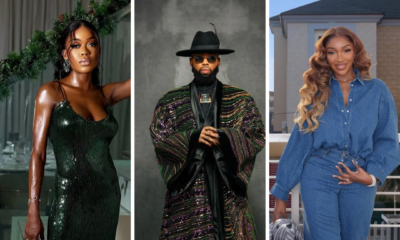Features
The Savvy Genius of Gen Z Nigerians & the #BuhariHasBeenABadBoy Hashtag
 You see her with her dark shades on speaking confidently and eloquently into the microphone, and a quiet awe washes over you. You know something’s coming when she leans forward, throws her head from side to side, fingers wagging at the camera, her confidence bolstered. Still, when she casually drops the line, We will still tackle Buhari, he has been a bad boy, you don’t see it coming. You think maybe you didn’t hear her properly. But then she says it again, He has been a bad boy. The audacity. Fluent and easy, the way the words fall from her mouth. The main shocker, though, comes when she reveals her age: 21. You think, Jesus, where did all this confidence come from?
You see her with her dark shades on speaking confidently and eloquently into the microphone, and a quiet awe washes over you. You know something’s coming when she leans forward, throws her head from side to side, fingers wagging at the camera, her confidence bolstered. Still, when she casually drops the line, We will still tackle Buhari, he has been a bad boy, you don’t see it coming. You think maybe you didn’t hear her properly. But then she says it again, He has been a bad boy. The audacity. Fluent and easy, the way the words fall from her mouth. The main shocker, though, comes when she reveals her age: 21. You think, Jesus, where did all this confidence come from?
Generation Z, or Gen Z for short, are the people born after Millennials (Generation Y) and before what is now known as Generation Alpha. They are said to be born between the mid to late 1990s (think 1996-7) and the early 2010s. This is the generation that came of age with social media within reach, smart phones diffuse in secondary schools. None of that TV station opening after noon that some millennials experienced at least in their young years—no, these ones’ birth arrived with cable TV services like DSTV in tow. For them, information has always been democratised, hence their unprecedentedly vast knowledge in … everything.
But not all of it is roses for these ones. Gen Z Nigerians were born to a Nigerian optimism that slowly faded into jadedness and defeat: the blind belief that a transition into democratic government heralded a better Nigeria, and the slow realisation, as administrations continued to pass, that, no, this was a wound left to fester, with any repair made only cosmetic. To know disappointment, the fading of hope, so intimately, to be moulded in it, tells on the psyche.
Then there are the more infrastructural disappointments: unlike millennials, Gen Z did not enjoy cheap but decent early education. The rot had begun to set in by the time the last millennials graduated from secondary school in 2010, 2011. By then public schools had become the eyesore it is today, with vacant window frames, ceilings sagging like sore lips, the absence of seats. They continue to graduate from universities at a time when unemployment is rife. Perhaps this is why they have been so passionate about the #SARSMustEnd movement: unemployment has forced them into more creative employ, and no one is more harassed by the Nigerian Police than a young and successful not-9-5er, not constrained by the formal strictures of stiff workplaces, able to commute daily in jeans and dreads and tattoos.
To know just how instrumental Gen Z Nigerians have been in this #SARSMustEnd movement, take a look at the Mochievous—the attorney who has been coordinating lawyers to ensure the release of unlawfully arrested protesters—tweet that of the 19 people arrested in Benin during the protest, a majority were teenagers.
A staple rhetoric during these protests has been that Nigerian youths are doing this for their children, so that they too will not have to protest when they become youths. Really, though, things are a lot more personal for Gen Z Nigerians. Their own fight for a better Nigeria (because this fight isn’t just for the end of police brutality), in a lot of ways, is for the now: that when they resume as students in the university strikes will be fewer and farther between; that they are not stuck with a now especially outdated classroom curriculum; that when they do graduate they meet a more welcoming job market.
My friend Sylvester will be 21 years old in November. He forsook attending the university because, according to him, Why spend so many years in the university then get out trying to get a job, when I can chase my dreams now, become successful, then face school later. The Gen Z jadedness and resilience, all in one sentence. And how is Sylvester chasing his dreams? He’s always loved fashion and wanted to be a fashion designer. But, one day scrolling through Instagram, where he spends a chunk of his time, he found the profile of popular stylist Swanky Jerry and felt the profession was a perfect gateway into the fashion business. It was time to get to work: over the next few days he sent direct messages to Swanky Jerry, who read and ignored them all. It was fine. He browsed through even more stylists on Instagram, found one that suited his taste, sent him a DM, and today Sylvester is following his dreams. The savvy genius of Gen Z Nigerians.
Chasing his dreams in a country that has offered him only little, Sylvester has been assaulted by the Special Anti-Robbery Squad (SARS) twice, most recently two or three months ago, at Yaba market, where he visited to buy fabric for his fashion business. For doing nothing but buying fabric at the market, Sylvester was beaten with sticks. Luckier than most, Sylvester has a friend in the police who was able to secure his release without having to pay a ransom. Luckier than most, his only loss was a few drops of blood, some skin off his knees and hands.
When I ask Sylvester how it feels to be a Gen Z Nigerian, he says sometimes he wishes he wasn’t Nigerian. And when I ask why, an exasperated Sylvester tells me, Dude, come on. The reasons are obvious; still, for me, he lists them out: he lives in a country where he doesn’t have basic rights, where he is afraid to look good, where he doesn’t have a voice. To cap it all off, he goes: I don’t think I’ve ever enjoyed being a Nigerian.
It is for all these reasons that Sylvester is invested in the #SARSMustEnd movement. He’s not keen on a Nigeria that will give him everything; he’s good with one where he’s allowed to be who he is, chase his dreams. He’s developed for himself the skill, sought out the opportunity. Now all that he needs is an environment where he is free to use both. Little wonder, then, the lady-in-the-video’s casual vitriol, her need for things as they are to become things as they were, her confidence in herself and the tools she has to bring about this change.
In some ways, the lives of Gen Z Nigerians have been leading up to this moment. Outside of the four walls of formal education, they have built expertise in various professions, learned a language that’s both easy and poetic (see the beauty in those few words: Buhari … he has been a bad boy). All of these on the internet, the Ground Zero of the protests. The moment, really, was made for them. And they are taking it.



















